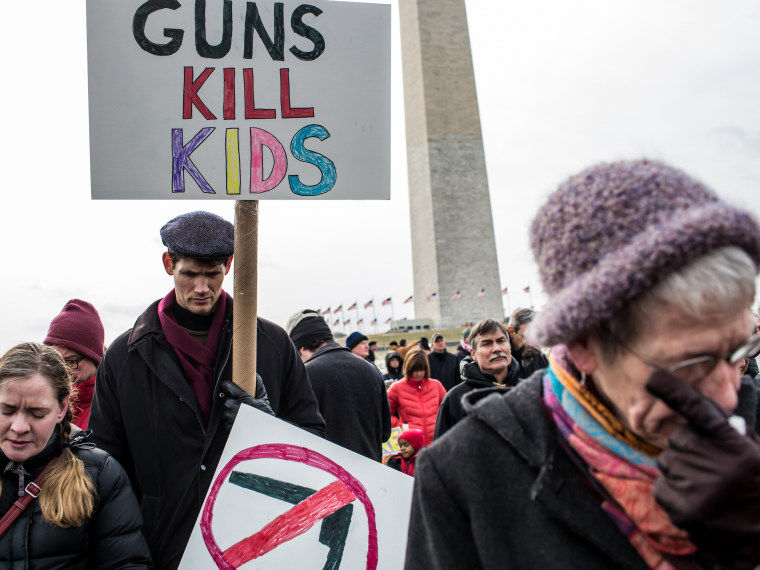It's been scarcely more than 100 days since the massacre at Sandy Hook Elementary School horrified the nation and seemed to galvanize the gun-limits movement. But with continued division in Congress, the time for sweeping reform may have slipped away.
msnbc's Chris Jansing asked DCC Chair and Rep. Steve Israel (D-NY.), Monday on Jansing & Co. whether the momentum that seemed to be in high gear after Newtown has been lost.
"If that is true, it would be tragic," Israel said. "We keep seeing these tragedies, like in Connecticut, and saying that they are teachable moments, and then we very quickly forget the lessons that we thought we had learned until the next tragedy. We can’t afford another tragedy."
"Members of Congress are paid to vote," Israel said. "We expect Speaker Boehner to allow us to vote on every element of gun violence prevention. People can vote for it, people can vote against it. Earn your salary and give us a vote, and don’t hide behind the speaker of the House. Let’s get it all out on the floor, let my colleagues vote and let their constituents know where they stand on these issues."
As the Senate prepares to bring gun control legislation to a vote this month, lawmakers seem divided over universal background checks--a proposal that recent polling shows has strong public backing. According to a Quinnipiac poll released last Thursday, 92% of voters--including 91% of gun-owning households--support universal background checks. By comparison, the abandoned assault weapons ban spearheaded by Sen. Dianne Feinstein, which was struck down amid heavy Republican opposition last month, polled with 56% support.
And yet, despite the widespread public support, an emotional plea from President Obama at a press conference last Thursday, and strong backing from Democrats in the upper chamber of Congress, opposition from the remainder of the Senate and the Republican majority in the House is likely to weaken an already-limited gun control package.
Even with the assault weapons ban scrapped, five Republican Senators including Rand Paul of Kentucky, Ted Cruz of Texas, Mike Lee of Utah, Marco Rubio of Florida, and James Inhofe of Oklahoma, vowed to filibuster the gun control package, meaning Democrats will need to harness 60 votes to bring the bill to a floor vote.
In a letter to Sen. Reid, the Senators say they will "oppose any legislation that would infringe on the American people's constitutional right to bear arms or on their ability to exercise this right without being subjected to government surveillance," signaling resistance to any gun control measures presented.
On CNN's State of the Union Sunday, Sen. Lindsey Graham said he did not intend to join his Republican colleagues in the filibuster. "The only way I would filibuster a bill is if Sen. Reid did not allow alternative amendments," he said.
Yet he said he would vote against expanded background checks, and that any bill including that provision would not make it out of the Senate.
"Nothing we're talking about would not have prevented Newtown from happening," Graham argued on Sunday. "The guy [Newtown shooter Adam Lanza] did not fail a background check."
Opposition to background checks seems to have become a rightwing litmus test. In a January 2013 Senate Judiciary Committee hearing, NRA Executive Vice President Wayne LaPierre was asked why he said in 1999, "We think it's reasonable to provide mandatory instant criminal background checks for every sale at every gun show. No loopholes anywhere for anyone" but 14 years later, opposes expanded background checks.
LaPierre argued that the current laws suffer from weak enforcement, saying, "I do not believe the way the law is working now, unfortunately, that it does do any good to extend the [background check law] to private sales between hobbyists and collectors."
